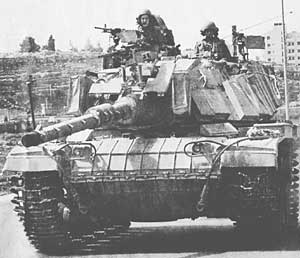
Israeli tank outside Ramallah, one of West Bank towns placed under closure.

 Israeli tank outside Ramallah, one of West Bank towns placed under closure. |
"I am asking for quick international forces...to protect us," Arafat said in a November 5 interview on the CBS program "60 Minutes."
Israeli prime minister Ehud Barak curtly replied, "If there will be a request for international forces, we will completely oppose it." Clinton stated, "The Israelis are strongly opposed to it, therefore it can't happen."
Washington has been pressing Palestinian and Israelis to implement a cease-fire agreement drawn up at Sharm el-Sheikh, Egypt, October 16-17 in negotiating sessions convened by Clinton. The U.S. president has invited both Arafat and Barak to Washington for separate talks.
On November 2, Arafat and Barak announced in separate statements that they would move to implement the cease-fire agreement.
One such move was a meeting in Cairo, Egypt, between the head of the Israeli secret police, Shin Bet, and the head of the Palestinian preventive security in the West Bank. They discussed the establishment of a trilateral "security committee" to oversee police measures undertaken by both sides. The third component of the committee would be the U.S. CIA, whose director, George Tenet, has been centrally involved in Israeli-Palestinian negotiations. Tenet convened a similar meeting in October during the Sharm el-Sheikh sessions.
The role of the CIA "first became explicit in the Wye River agreement between Israel and the Palestinians in 1998," the Financial Times of London reported. Under that U.S.-brokered agreement, signed by Arafat, president of the Palestinian National Authority, and then-prime minister Benjamin Netanyahu of Israel, Tel Aviv agreed to carry out some small-scale withdrawals from the West Bank in return for Palestinian concessions.
These concessions included agreement that the Palestine National Council would reaffirm an earlier vote removing clauses from the PLO charter that called for the overthrow of the Israeli state and the establishment of a democratic, secular Palestine. As part of the Israeli-PLO accords, Palestinian police have been trained by Israeli and U.S. intelligence cops.
Washington has sought to pressure the Palestinian leadership to use its police to keep the Palestinian population in check in the occupied territories.
In one such move, PNA information minister Yasir Abed Rabbo said the Palestinian Authority was taking steps to block youth under the age of 16 from attending demonstrations and other protests, using school disciplinary programs.
In another gesture, Rabbo stated that Palestinians will not proclaim statehood at a November 15 meeting of the PLO's Council as earlier announced.
In his November 2 announcement of the cease-fire, Arafat called for the "withdrawal of the occupation forces and their military units from all areas, cities, and residential neighborhoods that were occupied after 28 September, ending hostilities against our unarmed people and removing all forms of the siege."
Israeli troops maintain closure
Tel Aviv, however, has not relaxed the closure it imposed October 9 on the occupied territories (see article on this page). On November 7 the Israeli government reopened the Gaza international airport after having closed it off at the start of the latest conflict. The next day Tel Aviv shut the airport down again.
In another temporary gesture, the Israeli armed forces withdrew their tanks from the Karni crossing on the Israel-Gaza border, only to move them back the next day.
Barak suggested on November 7 that "we could resume negotiations which--based on the ideas discussed at Camp David--will lead to the creation of a viable Palestinian state." He appeared to be seeking, in part, to undercut possible world support for a unilateral proclamation of independence.
Barak, however, has made clear that the only "state" Tel Aviv will tolerate is the current, unviable setup of limited autonomy for a dozen small, dispersed pieces of land on territory that remains largely occupied by Israeli forces.
At July talks held at the U.S. presidential retreat of Camp David, Barak demanded Israeli sovereignty over both east and west Jerusalem, offering the PNA administrative authority only over some of the Palestinian quarters on the city's outskirts. The talks eventually broke down as Arafat balked at these demands, which many Palestinians have rejected and protested against.
In face of the ongoing Israeli repression, protests by Palestinians continue. On November 7, marches of 1,000 and 500 people took place in the West Bank towns of Ramallah and Hebron, respectively. Numerous other clashes have occurred, including confrontations between stone-throwing youths and Israeli soldiers at the Karni crossing between the Gaza Strip and Israel.
Related article:
Closure of West Bank, Gaza has brutal impact
Front page (for this issue) |
Home |
Text-version home